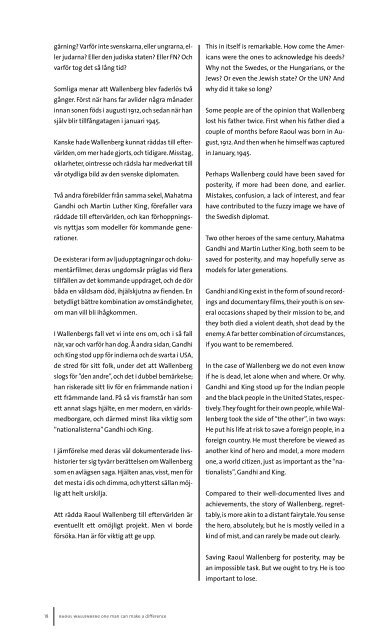r a o u l w a l l e n b e r g - mostar-friedensprojekt.de
r a o u l w a l l e n b e r g - mostar-friedensprojekt.de
r a o u l w a l l e n b e r g - mostar-friedensprojekt.de
Create successful ePaper yourself
Turn your PDF publications into a flip-book with our unique Google optimized e-Paper software.
gärning? Varför inte svenskarna, eller ungrarna, el-<br />
ler judarna? Eller <strong>de</strong>n judiska staten? Eller FN? Och<br />
varför tog <strong>de</strong>t så lång tid?<br />
Somliga menar att Wallenberg blev fa<strong>de</strong>rlös två<br />
gånger. Först när hans far avli<strong>de</strong>r några måna<strong>de</strong>r<br />
innan sonen föds i augusti 1912, och sedan när han<br />
själv blir tillfångatagen i januari 1945.<br />
Kanske ha<strong>de</strong> Wallenberg kunnat räddas till efter-<br />
värl<strong>de</strong>n, om mer ha<strong>de</strong> gjorts, och tidigare. Misstag,<br />
oklarheter, ointresse och rädsla har medverkat till<br />
vår otydliga bild av <strong>de</strong>n svenske diplomaten.<br />
Två andra förebil<strong>de</strong>r från samma sekel, Mahatma<br />
Gandhi och Martin Luther King, förefaller vara<br />
rädda<strong>de</strong> till eftervärl<strong>de</strong>n, och kan förhoppnings-<br />
vis nyttjas som mo<strong>de</strong>ller för komman<strong>de</strong> gene-<br />
rationer.<br />
De existerar i form av ljudupptagningar och doku-<br />
mentärfilmer, <strong>de</strong>ras ungdomsår präglas vid flera<br />
tillfällen av <strong>de</strong>t komman<strong>de</strong> uppdraget, och <strong>de</strong> dör<br />
båda en våldsam död, ihjälskjutna av fien<strong>de</strong>n. En<br />
betydligt bättre kombination av omständigheter,<br />
om man vill bli ihågkommen.<br />
I Wallenbergs fall vet vi inte ens om, och i så fall<br />
när, var och varför han dog. Å andra sidan, Gandhi<br />
och King stod upp för indierna och <strong>de</strong> svarta i USA,<br />
<strong>de</strong> stred för sitt folk, un<strong>de</strong>r <strong>de</strong>t att Wallenberg<br />
slogs för ”<strong>de</strong>n andre”, och <strong>de</strong>t i dubbel bemärkelse;<br />
han riskera<strong>de</strong> sitt liv för en främman<strong>de</strong> nation i<br />
ett främman<strong>de</strong> land. På så vis framstår han som<br />
ett annat slags hjälte, en mer mo<strong>de</strong>rn, en världs-<br />
medborgare, och därmed minst lika viktig som<br />
”nationalisterna” Gandhi och King.<br />
I jämförelse med <strong>de</strong>ras väl dokumentera<strong>de</strong> livs-<br />
historier ter sig tyvärr berättelsen om Wallenberg<br />
som en avlägsen saga. Hjälten anas, visst, men för<br />
<strong>de</strong>t mesta i dis och dimma, och ytterst sällan möj-<br />
lig att helt urskilja.<br />
Att rädda Raoul Wallenberg till eftervärl<strong>de</strong>n är<br />
eventuellt ett omöjligt projekt. Men vi bor<strong>de</strong><br />
försöka. Han är för viktig att ge upp.<br />
18 raoul wallenberg one man can make a difference<br />
This in itself is remarkable. How come the Amer-<br />
icans were the ones to acknowledge his <strong>de</strong>eds?<br />
Why not the Swe<strong>de</strong>s, or the Hungarians, or the<br />
Jews? Or even the Jewish state? Or the UN? And<br />
why did it take so long?<br />
Some people are of the opinion that Wallenberg<br />
lost his father twice. First when his father died a<br />
couple of months before Raoul was born in Au-<br />
gust, 1912. And then when he himself was captured<br />
in January, 1945.<br />
Perhaps Wallenberg could have been saved for<br />
posterity, if more had been done, and earlier.<br />
Mistakes, confusion, a lack of interest, and fear<br />
have contributed to the fuzzy image we have of<br />
the Swedish diplomat.<br />
Two other heroes of the same century, Mahatma<br />
Gandhi and Martin Luther King, both seem to be<br />
saved for posterity, and may hopefully serve as<br />
mo<strong>de</strong>ls for later generations.<br />
Gandhi and King exist in the form of sound record-<br />
ings and documentary films, their youth is on sev-<br />
eral occasions shaped by their mission to be, and<br />
they both died a violent <strong>de</strong>ath, shot <strong>de</strong>ad by the<br />
enemy. A far better combination of circumstances,<br />
if you want to be remembered.<br />
In the case of Wallenberg we do not even know<br />
if he is <strong>de</strong>ad, let alone when and where. Or why.<br />
Gandhi and King stood up for the Indian people<br />
and the black people in the United States, respec-<br />
tively. They fought for their own people, while Wal-<br />
lenberg took the si<strong>de</strong> of “the other”, in two ways:<br />
He put his life at risk to save a foreign people, in a<br />
foreign country. He must therefore be viewed as<br />
another kind of hero and mo<strong>de</strong>l, a more mo<strong>de</strong>rn<br />
one, a world citizen, just as important as the “na-<br />
tionalists”, Gandhi and King.<br />
Compared to their well-documented lives and<br />
achievements, the story of Wallenberg, regret-<br />
tably, is more akin to a distant fairytale. You sense<br />
the hero, absolutely, but he is mostly veiled in a<br />
kind of mist, and can rarely be ma<strong>de</strong> out clearly.<br />
Saving Raoul Wallenberg for posterity, may be<br />
an impossible task. But we ought to try. He is too<br />
important to lose.


